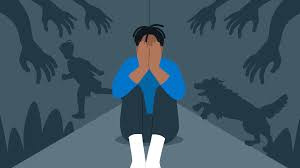There Are Only Two Real Emotions: Hurt or Frightened

Reading time 2 min
There Are Only Two Real Emotions: Hurt or Frightened
What if all your emotions could be boiled down to just
two?
Not anger. Not shame. Not even sadness.
Just…
hurt or frightened.
It sounds too simple. But sometimes, truth is simple — and painful. When you really sit with it, this idea begins to reveal something most of us have never been taught: that nearly everything we feel, do, avoid or regret comes from these two core states.
Here's what I mean:
1. Anger is often fear in disguise
Most people think anger is strength. But much of the time, it's fear with a mask on. Fear of disrespect, fear of rejection, fear of powerlessness. We get angry when we feel exposed or unsafe — especially if we've been taught that fear makes us weak. So instead of saying "I'm scared," we shout, slam doors, or burn bridges. But underneath it all, we're just afraid we'll lose something — or someone.
2. Silence can be a sign of deep hurt
When people go quiet, when they stop texting, stop sharing, or withdraw from conversations — we often take it personally. But silence is often the voice of pain. It says, "I don't feel safe here anymore." People retreat when they've been hurt, especially if they believe their pain won't be seen or understood. It's not indifference. It's a wound.
3. Addiction is a way to numb hurt or fear
We don't just fall into addiction by accident. We reach for something — alcohol, screens, pills, fantasy — because something in us is too painful or too terrifying to sit with. We want to escape the ache of not being enough, or the fear that life won't ever get better. Addiction isn't about weakness. It's about a wound that was never given care.
4. Control is rooted in fear
Trying to control others — their choices, their feelings, their freedom — is almost always about fear. Fear of being abandoned. Fear of being betrayed. Fear of not being chosen. It's the fear of chaos dressed up as "I just care about you." But underneath, it's about needing to feel safe — even at the cost of someone else's freedom.
5. Shame is hurt that turned inward
When someone says, "I feel like I'm not good enough," or "I always ruin things," they're not being dramatic — they're describing a wound. Shame is a deep hurt we've absorbed and believed. It grows when we don't feel seen, or when someone important made us feel like we weren't worthy of love. It's pain that became a belief.
6. Cruelty is often fear projected outward
People who mock, bully, or dominate others are often terrified underneath. Terrified of being small, weak, ignored, or irrelevant. Cruelty can be a twisted way of trying to feel powerful in a world that once made you feel invisible. Again — not an excuse. But if we don't understand the roots of cruelty, we'll never be able to stop it.
7. Naming your real emotion is the first step toward healing
Most of us never learned how to say: "I'm scared." Or: "I'm hurt." But when you do — when you name the thing honestly — something begins to loosen. You don't have to pretend, attack, run, or numb anymore. You can feel. You can ask for help. You can tell the truth. And that's how the cycle begins to break.
The Ending
Most people don't know what they're feeling. They just know something's wrong. Something's missing. Or something's too heavy to carry.
But the next time you feel overwhelmed, bitter, addicted, anxious
or alone — ask yourself two simple questions:
Am I hurt?
Am I frightened?
Start there. Don't judge it. Just name it.
Because when we
stop lying to ourselves about what we feel — we stop bleeding on
the people who didn't cut us.
And maybe, for the first time, we
begin to come home to ourselves.
Raymond and Ken
